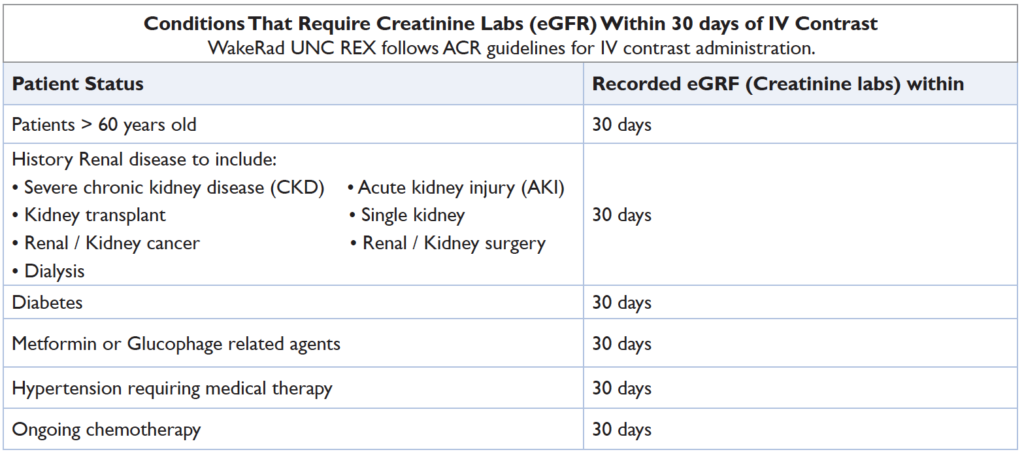Contrast Agents & Labs
Contrast agents or contrast media, are used to improve CT and MRI images. Often, contrast materials allow the radiologist to distinguish normal from abnormal conditions.
- Our radiologists carefully evaluate each patient’s condition and medical history to determine the need for IV contrast media. Common exams that require contrast are CT and MRI scans.
- Contrast can be used to improve the clarity of CT and MRI images, but isn’t always necessary.
- Call our Radiologist Hotline at 919-788-7880 x 1 if you have questions about contrast.
CT Contrast & Creatinine Ordering Guidelines
- Contrast can be used to improve the clarity of CT images, but isn’t always necessary.
- Non-ionic, iodinated contrast is the medium used at WakeRad UNC REX.
- Add “contrast as medically indicated by the radiologist” on the imaging order to enable us to administer CT contrast when necessary.
- This ensures patients are exposed to the least amount of radiation possible.
- Contrast is typically used when imaging for cancer, cancer progression, inflammation, infection or abscess, lymphadenopathy or pulmonary embolism.
- Contrast is also administered when asked to surveil acute abdominal pain and review abdominal organs.
- Call our Body Imaging Physician Hotline at 919-788-7978 if you have questions about contrast.
Creatinine Labs
- A current creatinine level is required before a CT with contrast exam can be performed.
- WakeRad UNC REX can complete this lab work in our office on the same day of the patient’s exam. We use an iSTAT device to obtain a patient’s creatinine level. This ensures accurate lab levels and that the CT exam is performed safely and efficiently.
- Order “Draw for Creatinine levels if medically needed” when you order a CT exam for any patient that meets the criteria below.

MRI Contrast & Creatinine Ordering Guidelines
-
Unless recommended by a radiologist, MRI exams are performed either “without contrast” or “without and with contrast.”
-
Our radiologists use patient notes and medical history to determine the need for contrast.
-
Contrast can be used to enhance the clarity of images, but isn’t always necessary.
-
-
One exception: All MRI arthrograms should be ordered “with contrast.”
-
Call our MRI Physician Hotline at 919-788-7978 if you have questions about contrast.
With Contrasts
- An MRI with contrast provides detailed views of organs and their function, inflammation, tumors or blood flow and supply.
- Contrast can provide more details to help diagnose and stage diseases.
- During an MRI with contrast, the patient is injected with the contrast media which works with the MRI’s electromagnet to create a sharper image.
- MRE patients will receive both oral and intravenous contrast to enhance the images.
- MRI contrast media does not contain iodine and rarely causes allergic reactions.
- MRI arthrograms should always be ordered “with contrast.”
Without Contrasts
- Most MRI exams are performed without contrast.
- Non-contrast exams provide better images of blood vessel activity, aneurysms and blocked blood vessels.
- Most orthopedic and joint MRI exams do not need contrast.
- Sometimes when a “without contrast” study is being performed, our radiologists may determine – during the exam – that contrast would help produce clearer images. If this is the case, we will immediately contact the ordering provider for an updated order.
Creatinine Labs
- A current creatinine level may be required before an MRI with contrast exam can be performed.
- WakeRad UNC REX can complete this lab work in our office on the same day of the patient’s exam. We use an iSTAT device to obtain a patient’s creatinine level. This ensures accurate lab levels and that the MRI exam is performed safely and efficiently.
- Order “Draw for Creatinine levels if medically needed” when you order an MRI exam for any patient who has any of the conditions listed below.
